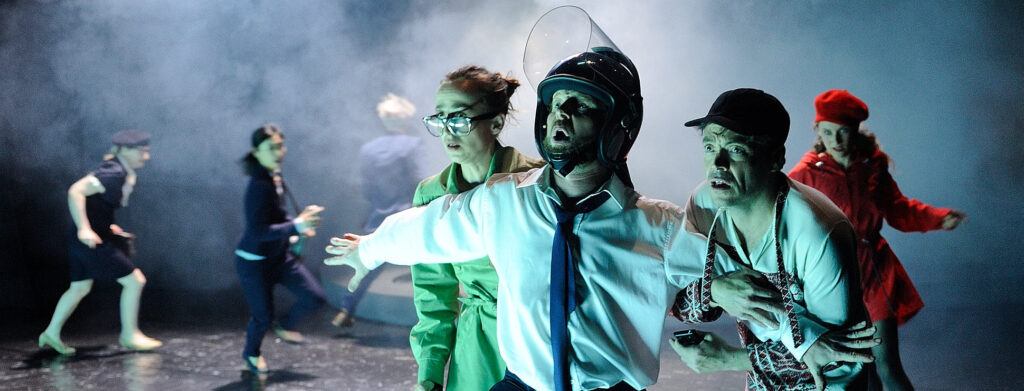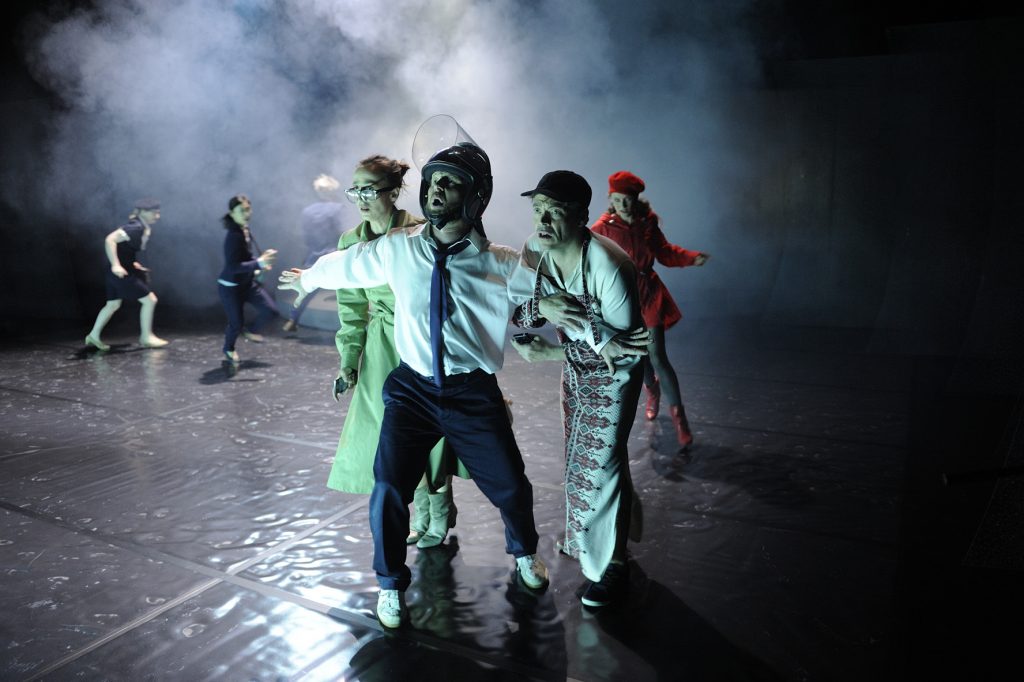
Ensemble-Production: Nico and the Navigators return to their roots and direct their magnifying glass again towards the matter of daily quirkiness.
The hour we knew too much of each other
The dynamic imagery of their music-theater productions have achieved Nico and the Navigators international acclaim and have brought them to many of Europe’s prestigious opera houses.
The premiere of their latest production The hour we knew too much of each other saw Nico and the Navigators return to their roots. As in earlier works, they magnified matters of daily quirkiness, taking a closer look at people’s rituals and habits, and exposing their intricate inconsistencies.
While Peter Handke’s 1992 original, The hour we know nothing of each other, had around three hundred silent characters move across the stage with exact directorial instruction, Nico and the Navigators use only eight performers, to explore the absurd daily encounters in a heterogeneous society against the backdrop of rapid technological developments and the loss of thought through overstimulation.
The hopeless attempts at communication of the comically tragic heroes of everyday life are playfully looked at by the performers through the use of new musical interpretations of songs from Bonnie “Prince” Billy to Benjamin Britten, with body language and text fragments as they pick up the beat of life, random and strict:
How estranged are we? Do we know too much of each other? What do we really know about one another? How are our stories related?
A production by Nico and the Navigators with Kampnagel Hamburg. Co-produced by Théâtre de Nîmes – scène conventionnée pour la danse contemporaine. Funded by the German Federal Cultural Foundation, by the Land of Berlin, the Schering Foundation, the Augstein Foundation and the Radial Foundation. In cooperation with Radialsystem V.

It’s a sparkling, often funny and sometimes deeply tragic collage of life in our self-inflicted lack of understanding.
At the Radialsystem V in Berlin, the theater ensemble, Nico and the Navigators, staged a furious urban collage: The hour we knew too much of each other. It’s a continuous, circulating coming-and-going, dancing, running and colliding. There is beautiful song and plenty of silence. Long-lasting dialogs were never an attribute of Nico and the Navigators. In its time, when in 1998 Nicola Hümpel and Oliver Proske founded the ensemble (or better yet, the idea of an ensemble with a varying cast) at the Bauhaus Dessau, it amazed audiences and many were instantly mesmerized. With its mix of acting, pantomime and dance, Nico and the Navigators offered the sort of theater rarely seen, bringing its microscopic examination of everyday occurrences to the stage, creating art from the ordinary the moment it is observed. Under the continued direction of Nicola Hümpel and Oliver Proske, the former student troupe from Dessau has since established itself internationally. Now at the Radialsystem V on Berlin’s Holzmarktstrasse opposite the Ostbahnhof and directly on the waterfront of the Spree, they present The hour we knew too much of each other, a charmingly obvious inference to Peter Handke’s piece from 1992, The hour we knew nothing of each other. Nico and the Navigators had previously presented their latest piece in Hamburg. While Handke calls for a huge ensemble, here only eight performers command the stage – an achievement in itself. And despite the consistently fast tempo of the ninety-minute piece, the performers undergo continual costume changes with characters reappearing soon after disappearance. The enactment is self-reflectively built around a thoughtfully placed center which could be understood as an ironic illustration of an exponentially frequented secret space – peoples paths always cross twice in life. What happens when women and men, mostly strangers, meet each other, collide, or race past one another? Everything is fleeting, it must go faster and yet somethings don’t work at all. A man doesn’t recognize his partners yearning for affection anymore. Or maybe he doesn’t want to after their relationship has long frosted over. Another man seems to have found joy in the form of a humanoid robot but that is soon over after it develops a life of its own. In another instance, a woman takes her time to think about whether she should give her sandwich away to a lady laying exhausted at her feet. She puts the sandwich down and hurries off as if her act was one of crime and not compassion. It’s a sparkling, often funny and sometimes deeply tragic collage of life in our self-inflicted lack of understanding.
With just eight performers they have brought the whole social cosmos to life. Speaking most eloquently with their bodies…
In a particle accelerator, charged particles are beamed into collision course. Physicists observe what happens when accelerating the particles to high kinetic energy and letting them collide into one another. The Berlin-based theater company, Nico and the Navigators, have brought this experimental procedure to the stage. Their piece, The hour we knew too much of each other, inspired by Peter Handke and premiered at Kampnagel, studies the structure of social fabric by propelling human monads into a course of collision. Bizarre characters appear left and right from behind the backdrops and cross a minimalistic stage meeting each other or more often missing each other. A metrosexual in a leather jacket and high heels, a militant jogger, a yuppie who has mind-melted with his smartphone, a diva, a bimbo, a doormat husband with his shrew of a wife populate this cabinet of curiosities. When they meet, large quantities of unease, embarrassment, alienation and violence are set free. Spontaneous fusions are rare and unstable. Over the ninety-minute piece only a nun and a woman in a burka walk side-by-side across the stage in seeming understanding. The experimental design which Nico and the Navigators apply originates from Handke’s 1992 piece, The hour we knew nothing of each other. It is nothing new. But it is apparently worthwhile to repeat the experiment periodically to verify current types of people with former insights. Thanks to their capable acting, dancing, and singing, the Berlin troupe successfully gave Handke’s fundamental idea a contemporary update. With just eight performers, they have brought the whole social cosmos to life. Speaking most eloquently with their bodies, spoken word takes on the functionality of a costume reaffirming each personality type. There is much to grin and laugh about in this character-theater. The underlying tone is of mild resignation. Once, about three quarters through the piece, all actors meet on stage briefly for a meaningful discourse. A brief episode before the absurd Ring around the Rosie continues.





Tickets for this date are not available yet. Leave your mail adress to get notified when tickets are available.